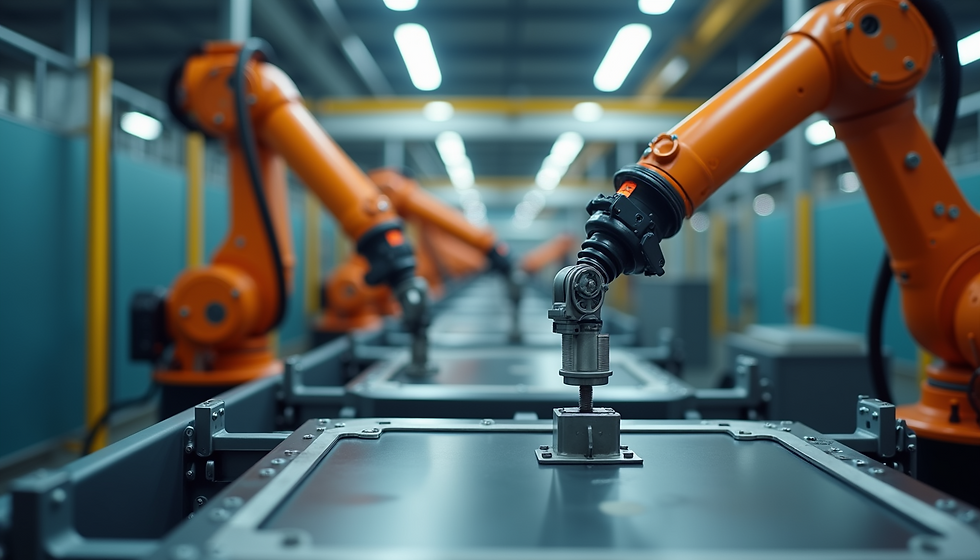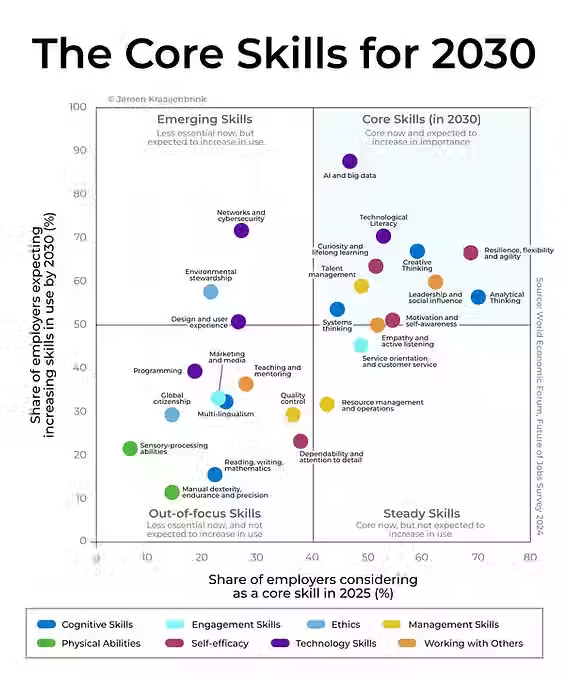The Future of Jobs & Skills: The consensus from three visions
- spwebsite123

- Apr 23, 2025
- 4 min read
Updated: Apr 30, 2025
The world of work is undergoing its most radical transformation in a century. Automation, artificial intelligence, and the green transition are reshaping industries faster than many professionals can adapt. But what does the data actually say about which jobs will thrive—and which will disappear?
There is no shortage of forecasts or predictions. However, they seem to offer sometimes contradictory views. Therefore, we take a brief look at reports from the World Economic Forum (WEF), the UK’s National Foundation for Educational Research (NFER), and the UK Government’s Future of Work Evidence Report provide critical insights—but do they agree?

Consensus
There have been some startling predictions about the impact of AI and the future of jobs. Notably, in March, Bill Gates made the eye catching claim that there would only be three professions left after the current revolution: a) energy experts, b) coders and c) biologists. However most do not see the future in such terms at the present time, though there are still a variety of scenarios being proposed.
We looked at four such scenarios from the organisations charged with predicting these developments, and looked at what they agree on:
1. Jobs on the Rise
All highlight explosive growth in:
Green Economy Roles: Renewable energy engineers, carbon accountants, sustainability consultants. (WEF predicts 30 million new green jobs globally by 2030.)
AI & Data-Driven Jobs: Machine learning specialists, AI ethicists, cybersecurity analysts. (NFER notes 70% of UK employers will prioritize digital skills by 2035.)
Care & Wellbeing Professions: Mental health counselors, geriatric caregivers (driven by aging populations).
2. Jobs in Decline
The consensus is clear: routine, manual, and middle-management roles are most at risk.
Administrative Clerks: Automation handles 85% of data entry (UK Gov report).
Traditional Manufacturing: Robotics and 3D printing replace assembly-line workers.
Fossil Fuel Sector Jobs: Coal, oil, and gas roles shrink as renewables dominate.
There are some differences between the emphasis of the reports, as shown below. However, the commonality is that all reports predicting that there will a growth in many sectors of skilled jobs where technological skills are integral, along with the creation of inequalities due to divides in skills and a shift towards automation.
Table 1: Focus of the reports
Source | Optimistic Outlook On | Pessimistic Warning |
WEF | AI creating more jobs than it displaces (97M new roles). | Skills gaps may leave millions behind. |
NFER (UK) | High demand for creative problem-solvers. | Geographic inequality—remote workers thrive, but rural areas lag. |
UK Gov Report | Reskilling programs can offset job losses. | Precarious gig work could expand without policy fixes. |
Skills trends
What skills are sustainable
We don't yet know enough to predict which precise skills are going to still be in demand in 5, 10 or certainly 20 years. However, there are clearly trends that point to skills having different prospects:
Growing Demand
Technical: AI literacy, quantum computing basics, green tech (e.g., hydrogen systems).
Human-Centric: Emotional intelligence, cross-cultural collaboration, ethical judgment.
Hybrid Skills: “Climate-aware coders” (blending sustainability + tech) are the new gold standard.
Shrinking Value
Pure Memorization: Facts are now AI’s domain.
Narrow Technical Expertise: Without adaptability, specialists risk obsolescence.
Routine Physical Labor: Even skilled trades (e.g., welding) face automation.
The further into the distance we predict, the harder it is to know, particularly as AI is developing in an exponential fashion. The World Economic Forum (2024) predicted the skills in most demand for 2030, where we can have a greater confidence looks like Fig 1. There are some clear themes: Those working closer to digital technology are anticipating a more radical shift in new skills, while "people" skills are evolving more gradually.
Fig 1: The WEF's core skills for 2030

Risks & Opportunities
There are risks and opportunities for professionals as we move forward:
Risks]
Polarisation: High-paid knowledge workers vs. struggling gig labourers: Being stuck in the latter camp may prove an increasing struggle over time.
Speed of Change: Many mid-career professionals may lack time, resources (or even the career clarity) to reskill.
Geographic Disparity: Urban “innovation hubs” pull ahead of deindustrialized regions, leaving people in increasingly left-behind areas.
Opportunities
Lifelong Learning: Micro-credentials (e.g., Google’s AI certs) trump degrees, online courses and employers who provide workplace training offer continuous and growing opportunities.
Cross-Disciplinary Moves: As some sectors decline, other adjacent sectors will need skilled people to scale e.g. ex-oil engineers may transfer into offshore wind.
Global Remote Work: A Kenyan data analyst can now work for a Berlin green startup.
The key differentiator that dictates which side of the line people will find themselves is the possession of relevant, high value skills.
Actions
The generic actions for today's professionals are clear:
Upskill Proactively
Prioritize AI fluency (even if you’re not in tech) and sustainability literacy: A marketer should learn carbon footprint analysis for ESG campaigns.
Future-Proof Your Role
Ask: “Can an AI or robot do this?” If yes, pivot toward oversight, creativity, or ethics: Accountants can become carbon auditors, HR managers can become AI bias specialists.
Explore opportunities at the Green & Digital intersection
The safest jobs merge both (e.g., smart grid engineers, circular economy supply chain analysts).
Comments